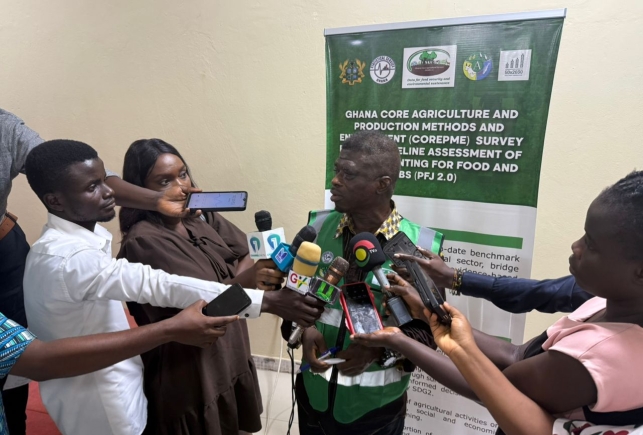The Ghana Statistical Service (GSS), in collaboration with the Ministry of Food and Agriculture (MoFA), has concluded a two-week intensive training for field officers as part of the Ghana Core Agriculture and Production Methods and Environment (CorePME) Survey.
The survey will serve as the baseline assessment for Phase 2 of the government’s flagship Planting for Food and Jobs (PFJ 2.0) programme.
At a closing ceremony held at the Windy Lodge Hotel in Winneba last Saturday, Dr. Bernice Serwah Ofosu-Baadu, Coordinator of the project, expressed gratitude to the participants, trainers, and facilitators for their dedication.
She emphasised the survey’s significance in collecting reliable agricultural data to support policy decisions that will enhance food security, sustainable farming, and economic growth.
“This survey marks a significant step in the baseline assessment of Phase 2 of the Planting for Food and Jobs initiative, which remains a cornerstone of Ghana’s agricultural transformation,” Dr. Ofosu-Baadu stated.
The CorePME survey is part of the broader Ghana Core Agriculture Surveys (GCAS++), designed to generate accurate statistics on agricultural production, farm practices, and environmental sustainability.
It will assess the impact of PFJ 2.0 while providing data on Sustainable Development Goal (SDG) 2.4.1, which tracks the proportion of agricultural land under productive and sustainable practices.
A total of 220 trained field officers will deploy nationwide from February 3 to March 20, 2025, using Computer-Assisted Personal Interviews (CAPI) to ensure data accuracy.
The collected data will provide key insights into Ghana’s agricultural production systems, resource use, and environmental impact, helping policymakers craft targeted interventions to boost productivity and resilience in the sector.
Speaking at the event, the Acting Deputy Government Statistician, Mr. Edward Asuo Afram, underscored the critical role of agriculture in Ghana’s economy
. “Agriculture employs more people in Ghana than any other sector. The information we are collecting will help policymakers understand production levels, workforce distribution, and input usage, so we can implement policies that will help the sector grow. Currently, agriculture contributes about 5-6 percent to GDP, and we hope to push this to 8-10 percent,” he said.
Mr. Afram assured stakeholders that GSS has introduced a monitoring dashboard to ensure real-time tracking of fieldwork and data collection.
He called on farmers, households, and institutions to cooperate with enumerators, assuring them that all information provided would remain strictly confidential, in line with the Statistical Service Act, 2019 (Act 1003).
The CorePME survey is expected to inform Ghana’s progress towards key national and international development targets, including the Medium-Term Development Framework, 12 out of the 17 SDGs, and the Malabo Commitments under the Comprehensive Africa Agriculture Development Programme (CAADP).
With the successful training of field officers now complete, stakeholders are optimistic that the survey will provide the necessary data to shape policies that will drive sustainable agricultural growth and ensure the long-term success of PFJ 2.0.
